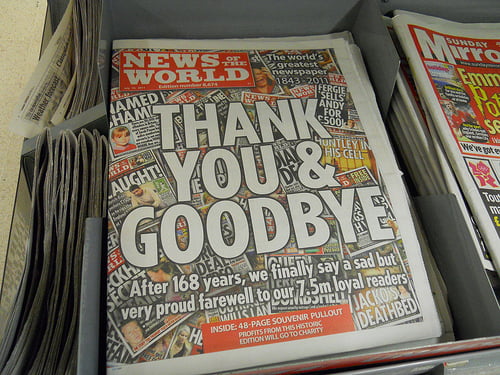

News
A free press would be a good idea
In an apocryphal story worthy of QI, when Gandhi was asked what he thought of western civilisation, he replied, “It would be a good idea.” We have the same feeling towards the idea of a free press, and, on the eve of Leveson, Simon Leadbetter asks what we would like to see in the report.
As we wrote last week, the debate about a free press is raging in the lead up to Lord Justice Leveson’s report into the culture, practices and ethics of the British press, following the News International phone hacking scandal. In reality, the debate has been raging for nearly four centuries.
The core tension is between the essential freedom and demonstrable irresponsibility of the national press.
The national press has been lobbying, bullying and publishing like mad to secure self-regulation. They are certainly not exhibiting any humility on why they are in this self-made mess.
Campaigners such as HackedOff and individuals affected by press misbehaviour have been arguing for some form of statutory regulation.
What is so often lost in the fevered debate are the real victims of press misbehaviour and phone hacking (the McCanns, Dowlers and Christopher Jefferies, in addition to the families of Hillsborough and Soham victims) and the press’ role in corrupting the police. Also lost is that almost everyone believes in the vital role of robust and unfettered investigative journalism within a free press and functioning democracy.
Let us start be repeating that our national press is not free. It is owned by a narrow clique of billionaires with their own agenda, both political and economic. Secondly, corporations who also have their own commercial agenda, fund the press. It was the loss of advertiser revenue, more than public feeling, that ultimately signed the death warrant of the News of the World.
The misinformation (unintentional inaccuracy) and disinformation (intentional inaccuracy) about statistics, science, climate change and investment regularly peddled in the national press and magazines are a direct result of publisher and advertiser prejudice and agendas. We are happy to declare our own interest in promoting sustainable investment as more responsible than investing unsustainably.
The non-profit organisation Fullfact provides an exceptional service at holding the media to account mis- and disinformation.
It is our belief that the British press has lost the right to self-regulate and lacks the real freedom to do so. Simply comparing the behaviour of the unregulated News International over the phone hacking scandal (years of obfuscation and obstruction) and the regulated BBC over the Jimmy Savile scandal (heads rolled and an open inquiry was established) tells you everything you need to know about whether the British press can self-regulate.
To secure a genuinely free press, we are looking for the following in any new regulatory body:
– Genuine independence from media owners, corporate influence and politicians
Rather than being staffed and funded by media owners and editors and overseen by politicians, any regulatory body should consist of truly independent laypersons who can review journalism. In terms of funding, the press, rather than the taxpayer, should underwrite any cost, which could be a simply levy on each newspaper group based on audited audience figures, both on and offline.
– An affordable and rapid right of reply/arbitration
Libel action is prohibitively expensive and time-consuming and thus out of the reach of most people. Any new body must be able to respond to complaints and compel media owners to participate in any investigation. As an independent body, it should also be able to initiate its own investigations, rather than simply responding to complaints.
– Robust investigative powers
The challenge of many regulators is a lack of resources to effectively hold those they regulate to account. Any new body should be sufficiently resourced to undertake meaningful investigations of any alleged misbehaviour.
– Meaningful redress and sanction
The new body needs real teeth to compel the press to publish retractions equal in profile tthe original coverage, pay punitive compensation to victims and impose restrictions on regular transgressors.
– Statutory underpinning
The press has repeatedly demonstrated that if cannot self-regulate. Due to the ownership and funding structure, it cannot be free. To ensure compliance there needs to be statutory underpinning that means every national newspaper must participate and adhere to the rules and rulings of the body. The editor of The Times yesterday suggested judicial underpinning which would remove some concerns about political interference. Other than establishing the regulatory authority’s powers, politicians should have no further role in the body
At lunchtime today, the government will get the report, leading to a serious debate within Whitehall. Tomorrow we will all get to see the report and hear the government’s united or disunited response.
But before that – tonight at 8pm on Channel 4 – there is a documentary on Hugh Grant’s battle with the press.
We will be taking a considered view of what the Leveson Report recommends and how our politicians respond in our Guide to Responsible Media in December. Sign up to our newsletter to receive a copy for free.
Further reading:
Freedom of expression is not the same as a freedom to mislead


 Environment11 months ago
Environment11 months agoAre Polymer Banknotes: an Eco-Friendly Trend or a Groundswell?

 Features10 months ago
Features10 months agoEco-Friendly Cryptocurrencies: Sustainable Investment Choices

 Features11 months ago
Features11 months agoEco-Friendly Crypto Traders Must Find the Right Exchange

 Energy10 months ago
Energy10 months agoThe Growing Role of Solar Panels in Ireland’s Energy Future





























